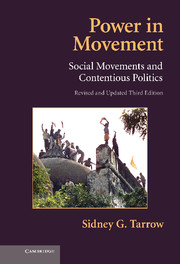Book contents
- Frontmatter
- Contents
- List of Figures
- List of Tables
- Preface
- Acknowledgments
- Introduction
- 1 Contentious Politics and Social Movements
- PART I THE BIRTH OF THE MODERN SOCIAL MOVEMENT
- PART II POWERS IN MOVEMENT
- 5 Acting Contentiously
- 6 Networks and Organizations
- 7 Making Meanings
- 8 Threats, Opportunities, and Regimes
- PART III DYNAMICS OF CONTENTION
- Conclusions: The Future of Social Movements
- Sources
- Index
- Titles in the series
8 - Threats, Opportunities, and Regimes
- Frontmatter
- Contents
- List of Figures
- List of Tables
- Preface
- Acknowledgments
- Introduction
- 1 Contentious Politics and Social Movements
- PART I THE BIRTH OF THE MODERN SOCIAL MOVEMENT
- PART II POWERS IN MOVEMENT
- 5 Acting Contentiously
- 6 Networks and Organizations
- 7 Making Meanings
- 8 Threats, Opportunities, and Regimes
- PART III DYNAMICS OF CONTENTION
- Conclusions: The Future of Social Movements
- Sources
- Index
- Titles in the series
Summary
A COLLAPSING REGIME
In the late 1980s, contentious politics arose in the highly centralized and police-and-party controlled Soviet Union. Mark Beissinger documented the rise and dynamics of contentious politics there – which began as a wave of peaceful demonstrations, strikes, and protest marches, but evolved into violent nationalist-inspired riots and militarized conflicts (Beissinger 2002). Figure 8.1 shows what Beissinger found when he employed a protest event analysis to see what was happening during the last years of the Soviet Union:
How could so massive a wave of political contention develop in so centralized a regime after decades of repression? The simplest answer was provided by Alexis de Tocqueville. Because people act on opportunities, he observed, “the most perilous moment for a bad government is one when it seeks to mend its ways” (1955: 176–177). Tocqueville was writing of the collapse of the French Old Regime; had he been present two hundred years later, he might well have applied his theory to the Soviet Union. There, as in France in the 1780s, an international power mired in corruption and torpor and unable to compete with a more dynamic market-oriented society (Bunce 1985; cf. Skocpol 1979) sought to reform itself from within. Incoming party secretary Mikhael Gorbachev was convinced that his country could not survive as a world power without reform. As a result, the late 1980s “engendered a process of liberalization that sparked an explosion of organized extra-state political activity” (Fish 1995: 32).
- Type
- Chapter
- Information
- Power in MovementSocial Movements and Contentious Politics, pp. 157 - 180Publisher: Cambridge University PressPrint publication year: 2011
- 1
- Cited by

